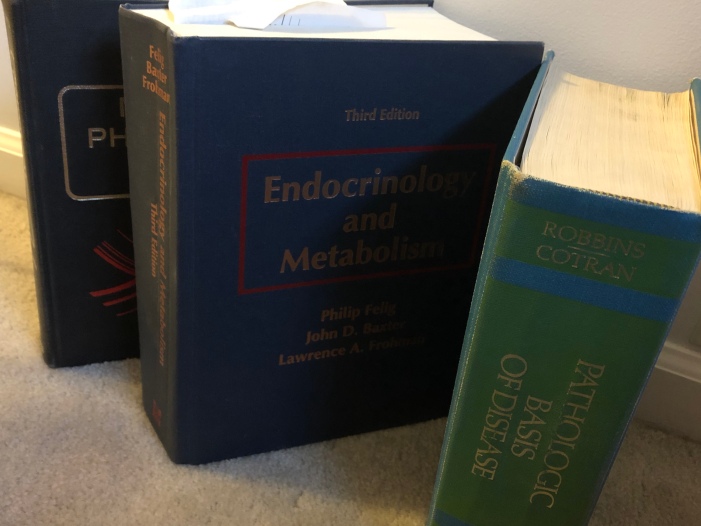The end of our time in Pittsburgh was filled with emotion. I looked forward to being closer to family, but I dreaded having to start anew in another unfamiliar city. I wasn’t sure what I was going to be doing when I got to Albany. I hadn’t found a job yet, doing a search long distance proved fruitless. As a result, like my move to Pittsburgh four years earlier, I was relocating without anything certain. Gary, on the other hand, knew exactly what he would be doing, but it was daunting. Internship and residency, more tests of his knowledge, skills and endurance awaited. We were also saying good-bye to close friends who were scattering far and wide, each going to different programs. It was bittersweet.
It was into this emotional stew that our families arrived for graduation. My parents flew in and were staying in dorm rooms on the University of Pittsburgh campus, just a few blocks from our apartment. Gary’s parents, sisters and brother drove from Queens in his Dad’s Cadillac. They stayed at a hotel. Planning for our families to be together was stressful. Everyone got along fine, but we were still new at this. Our families’ styles were so different. Gary’s family would enjoy a tour of the medical school, with extended stops in the pathology and anatomy labs to look at specimens. Not so much for my parents – a tour of the med school would be fine, but they’d prefer to skip the labs (or maybe it was just me that didn’t want to go to the labs!). They would be more inclined to visit a museum or take a walk in Schenley Park.
Meals were another thing. Gary’s parents didn’t require kosher food, but there were limited options. It was important to have fish (not shellfish) available. My parents liked fish, so that wasn’t a problem. The question was where to go to get it, Pittsburgh wasn’t famous for seafood. Gary and I, living on a tight budget, didn’t go to the fancier restaurants either. My perception was that the Baksts liked finer things (note the aforementioned Cadillac). Gary had told me years before that his folks didn’t go out to eat often and that his mom liked a restaurant that had white tablecloths. Celebrating Gary’s graduation was a big deal. I wanted the dinner to be perfect. Not too much pressure!
After asking around, I made a reservation at the Fox Chapel Yacht Club. After all my worry, it went fine. At least I think it did. I have no memories of the meal itself. So, I am assuming if something horrible happened, I would remember! I do have some photos, showing us smiling, which may, or may not, support my assumption.


We did a mix of things over the two days they were there, showing them around and leaving time to relax. We always loved showing visitors the Cathedral of Learning, a gothic tower at the center of a green space on Pitt’s campus. On the ground floor of the cathedral there were model traditional classrooms from other countries, including Sweden, Israel, Poland, among others. I never got tired of looking at them.
We successfully made it to the morning of graduation. Everyone gathered at our apartment. Gary put on his gown. I asked him to put on the cap so I could take some pictures. He was none too pleased. I think his nerves were a little frayed, he was impatient to leave and he was taking his stress out on me. Rochelle interjected, asking him to cooperate, after all he would want pictures. He did, but he wasn’t happy.

Then he left. We would meet up with him after the graduation.
I led our group to the Carnegie Music Hall, so many things in Pittsburgh bear the Carnegie name, where the graduation ceremony was held. It was a gray, rainy day, but the Hall was only a few blocks from our apartment.
We entered the grand foyer of the hall, with its marble floors and ornate columns, looking appropriately majestic for the occasion. We saw all the graduates gathered on one side, in their black robes and green hoods, arranged for a group photo. We stood for a minute, scanning the group, finally spotting Gary in the first row. I waved and smiled. He looked happier, more relaxed.
We went up to the balcony to take our seats. My parents were on my right, David sat to my left. I looked through the program. In front of Gary’s name there were two symbols; an asterisk indicating that he was Cum Laude, and a small cross which meant that he was admitted to the medical honor society (Alpha Omega Alpha). I proudly pointed out the honors to everyone. Not many of his classmates had achieved either honor, much less both.
During the ceremony, each time I turned to look at David, he had tears in his eyes. At one point, as he dabbed his eyes with his handkerchief, he whispered, “Who would have thought I would get to see this?” He shook his head in disbelief. “I had nothing when I came here.”
It had been quite a journey for the entire Bakst family.



